We get it; you're busy.
It's tricky to balance focusing on your law practice and marketing your firm to keep getting new clients.
Some would suggest you go for Facebook, while some will direct you towards Google Ads. Some even swear by SEO.
However, there's a middle road: if you understand which approach is most effective, you can focus on one strategy instead of wasting time behind a strategy that doesn't appeal to you.
"Knowing where to start is half the battle."
In this guide, you'll learn everything you need, depending on your goals, to market your law firm like a pro—from SEO to measuring performance and everything in between.
We are going to cover:

It may be tempting to invest all your earnings at a time to experiment with various marketing strategies. But not only will you waste money, but you'll also lose the enthusiasm to continue if you don't reap the results soon.
To figure out how much you should invest in your marketing campaigns, you need to decode three elements:

If you toss your money blindly at marketing and expect customers to knock on your door, you end up spending a lot more than you can afford.
Do you know what experts suggest in terms of investment?
So, pre-decide a reasonable amount you can spend on your marketing goals; recommended, approximately 8 to 12% of your revenue.

Calculating your cases and their payment per year helps you understand your revenue total and how much you can put aside for your goals.
Once you answer these questions, you will lay the groundwork to identify your total law firm marketing budget.
When you reach a specific amount for marketing, swear to stay within its limits until you start receiving results. After that, if you start getting more clients than usual, you may want to upgrade your marketing strategies along with the budget.

The simple answer is: create a marketing plan.
It doesn't have to be long. You can fit a marketing plan into one page.
How?
It's simple.
Below I have outlined the three different sections you need to build a marketing plan:
First things first, who do you serve?
The answer to this question alone will fine-tune your marketing strategy to a great extent. Because the content you create, the email you write, or the ads you target, in the end, everything will reach your targeted audience. So make sure you know who your ideal clients are.
And if you already have a fair idea of your clientele, better to put it in writing

Ask yourself the below-given questions if you want a firm grip on your buyer persona (your clients).
Understanding your targeted audience is critical to reaching the people you want to convert into your clients.
Practically, you don't find your clients. Through online marketing, you ensure they find you.
A marketing strategy of a law firm must include a tool specifically designed to attract your potential clients.
So which marketing tool do you need?

To answer the questions, make a list of all available marketing channels, including:




Or any other marketing strategy you have in mind. We will explore all these strategies to give you a good idea about the strategy you should choose. You can either choose one strategy or mix a couple of them for the best results.

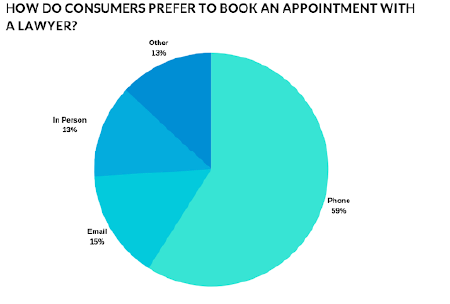
To answer the questions, make a list of all available marketing channels, including:
To achieve your marketing goals or get your desired results, you have to measure your campaign's progress constantly. You should know how your campaigns are performing and where they need necessary changes.
For instance, if you rely on SEO to market your firm, make sure you have metrics to measure it. Or, if you are working with a marketing agency, make sure they give you measurable and easily understandable reports. It helps you see your progress, where your firm stands, and where it's heading.

In this digital age, your law firm's website acts as your first impression on clients. When clients come searching for you through online sources, your website is the first thing they will notice. Your website can make or break your client relationships.
A well-designed website shines across the web—leading clients towards your result-oriented legal practice.
Website of Blacktown Lawyers is an excellent example to display here:
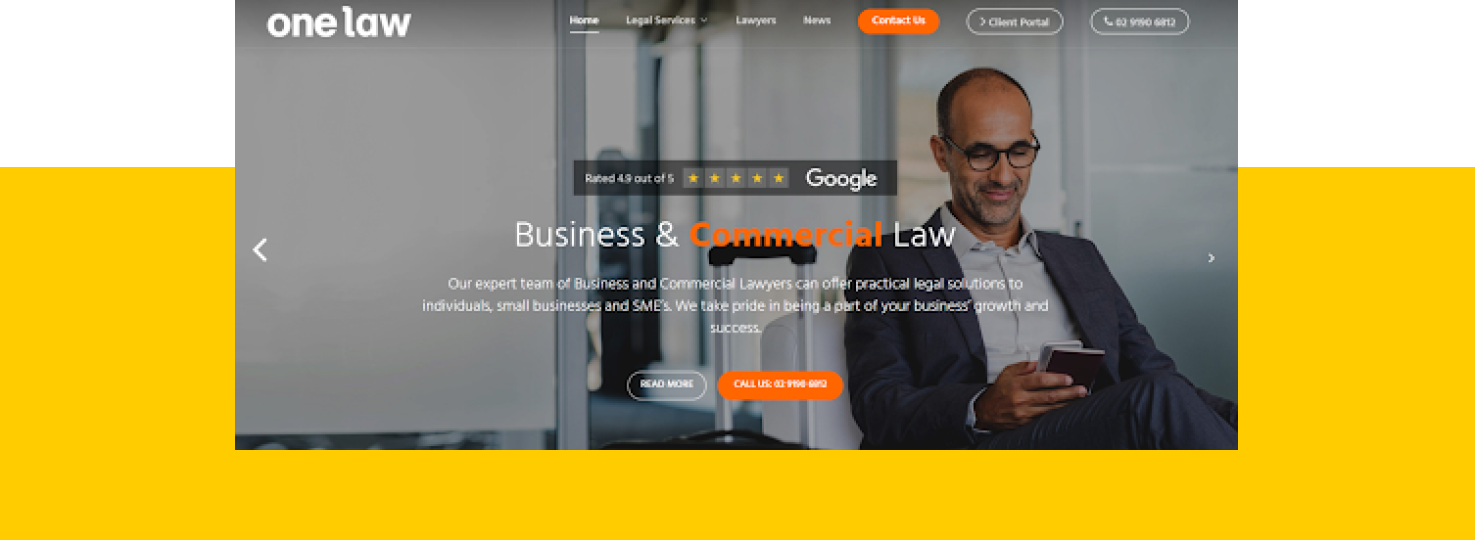

It's challenging to catch the attention of people, let alone holding it for a while. That's why you need a captivating, entertaining, and informative website to maintain a high standard across the internet.
Remember! All your other marketing efforts guide users to your website.
SEO stands for search engine optimization. It's the process of enhancing your website's visibility when users search for your products or services on Google, Bing, and other search engines.
Why do you need SEO?
Let the stats speak for themselves:
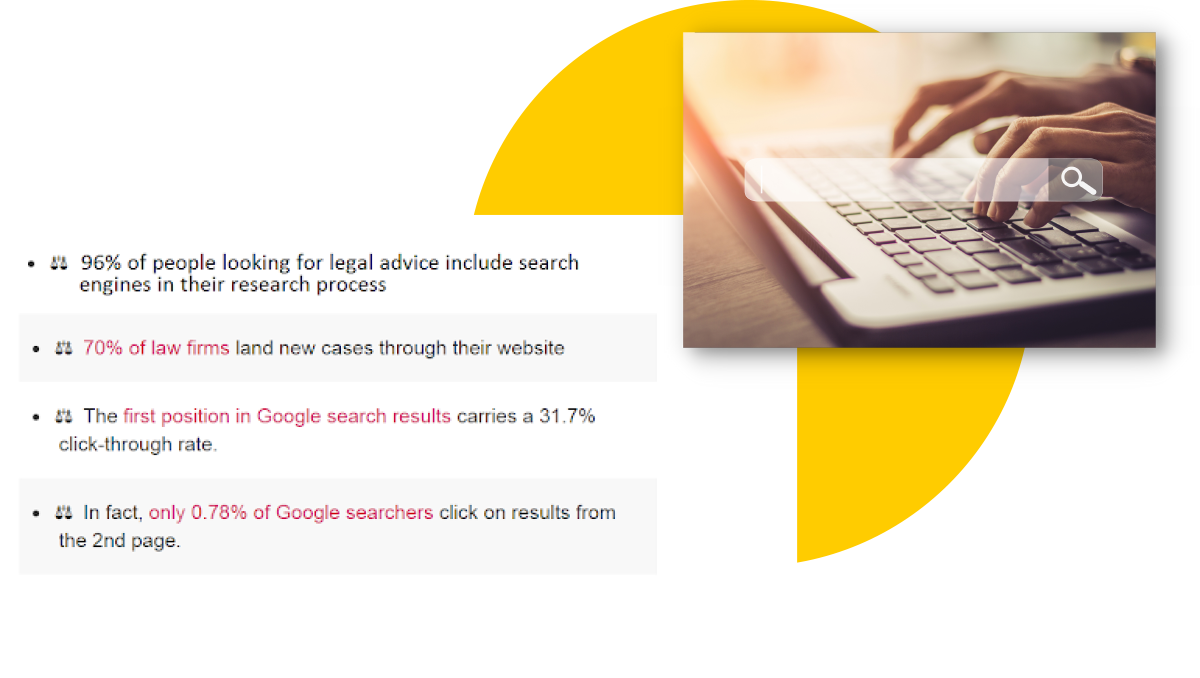
In a nutshell, the primary benefits of search engine optimization (SEO) are:
Suffice to say that your website is the foundation of successful SEO.
Want to begin your legal SEO campaign?
Here's what you should include:
Keyword research is about using tools and tactics to uncover the terms or phrases people use to search for products or services. In your case, you need to find words people use to discover legal services.
Why do you need to search these terms?
Because you simply can't rank for "attorney." In other words, very few people want to find an attorney. Instead, they will arrive at the search engines to find the solution to their problems.
As an example, the keyword (term) in the image below is from someone who wants to sue someone for workplace bullying:

Of course, phrases with such intent may have less traffic than other professional terms; they have two advantages:
Apart from these terms, you also need to find keywords having research intent. They are generally questions starting with "why" or "how." Users with research intent want awareness—answers to their problems—before they think of a solution.
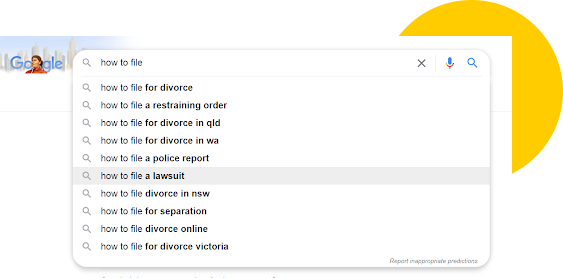
To collect the list keywords, you can take the help of Google auto-suggest (example shared above) for free. But this is more of a guessing game. You don't know which keywords drive more traffic.
Another option is outsourcing keyword research to experts providing SEO services for lawyers. Or buy a keyword research tool.
As an example, the keyword (term) in the image below is from someone who wants to sue someone for workplace bullying:






Here's the screenshot of keyword suggestions from Semrush with keyword volume (how many people search with this keyword) and keyword difficulty (how difficult and easy it is to rank for the specific keyword):

Once you finish your keyword research, you can create a strategy around those keywords. Let's say the research tells you what content you need for your web pages, blog posts, case studies, white papers, videos, and other marketing assets.
Your researched terms may or may not fit in your legal services. Creating content around some topics puts your firm in front of users who came for information. If they find your content useful, they will start seeing you as an expert.
Content quality, however, matters the most here. Plus, educative content accumulates more likes, shares, comments, and even backlinks.
There's no question about that. You need a responsive website, considering people use different devices to conduct online research.
If you have one, you're ready to include the crucial elements of website optimization.
How you organize your site and put your content on your site's architecture is a vital part of an SEO-friendly website.
Logically, your site must be structured to help users find the information they are looking for. They must understand, at first glance, where to go next (probably your contact details or more info on a similar topic).
As you want your prospects to discover your service or contact section as soon as possible, set that option to the left-hand side of the navigation bar.
Take a look at the example below with the contact number sitting at the top left of the website:
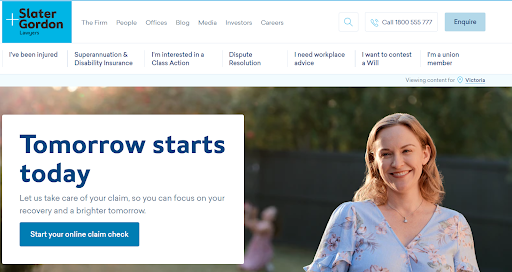
If you have conducted keyword research, use them in your URLs first, making sure not to overdo them.
For example, if you solve real estate relevant issues, your URL should include a similar keyword like this:

Having a blog is as important as having any marketing strategy.
Blog posts give you a wide room for keyword targeting. While your service pages don't qualify for some queries, the phrases or terms you research earn a ton of traffic via blog posts. If you post consistently, you are keeping your site fresh and up-to-date.
Google suggests "freshness" as a ranking signal, rewarding high ranks to the sites with frequently updated content.
Let's study an example of a keyword and its usage in a blog post.
Each month, a hundred people search for "workers compensation claim" in Australia; that counts to over a thousand people per year.

You can write a blog post with this title and optimize the blog post for similar terms like this:

Page speed has always been a ranking factor for desktop as well as mobile searches.
Google states that pages delivering a slow experience to users will be adversely affected.
From users' perspective, pages taking too much to load will make users jump to competitors' sites, especially if they are in an immediate need to hire a lawyer.
A potential client, brooding over a legal issue, can't wait for too long to sort out the problem or find the way out. They are much less patient than people waiting 30 minutes to get their pizza delivered at home. In fact, their patience is as low as 3 seconds.
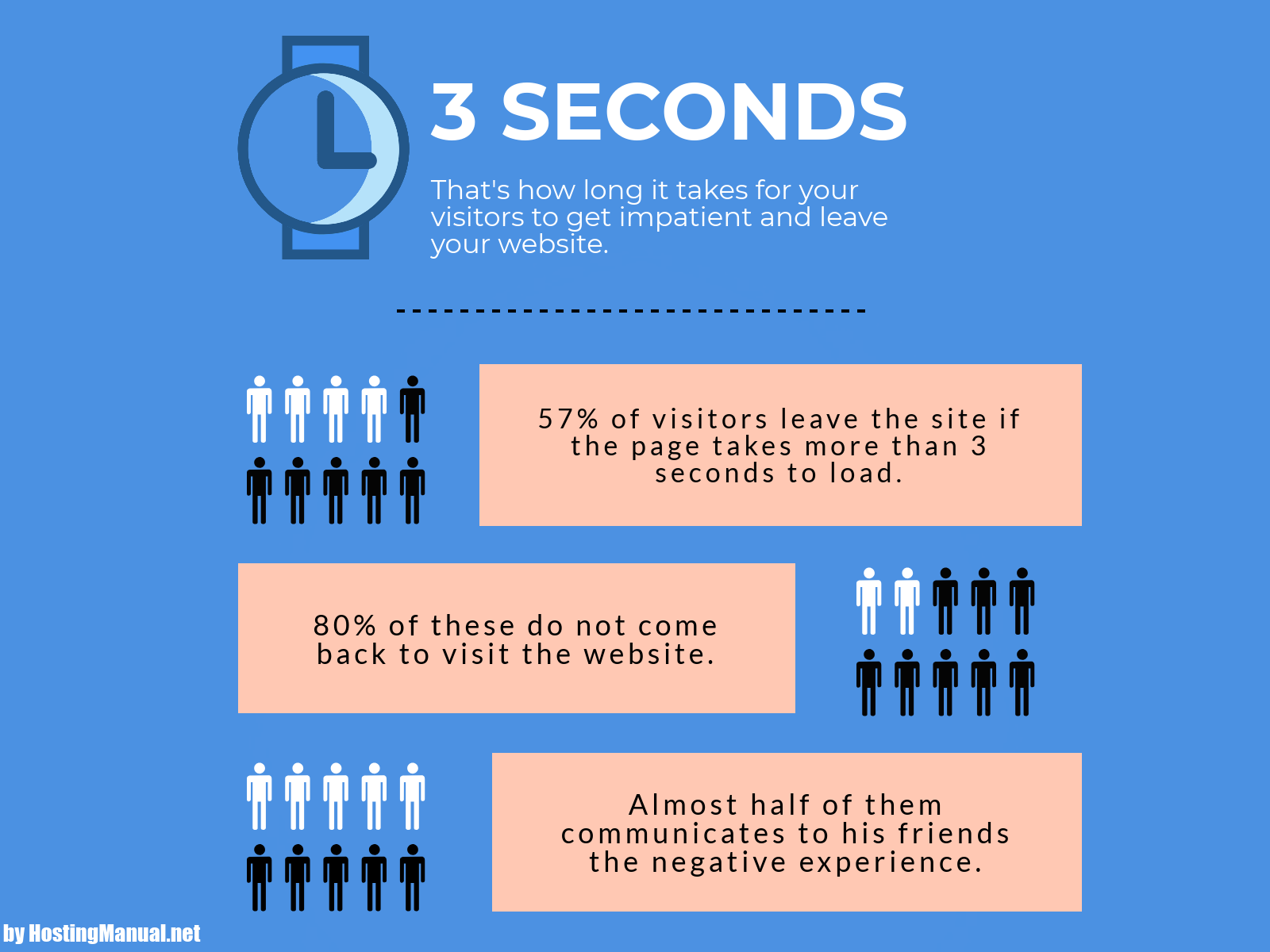
Thus, make sure your site speed takes 3 seconds or less to load.
Without any doubt, great content is the base of SEO if you want your site to push its way to high Google rankings.
Besides your blog post, where should you incorporate content?
Your service pages.
A landing page painting a clear picture of your services through your words is a must. Readers should get the idea of the services you offer when they navigate your site.
Make sure you add individual pages for each of your skills.
For example, you can create a page explaining your law firm's services as a whole and consists of "why" clients should choose you.
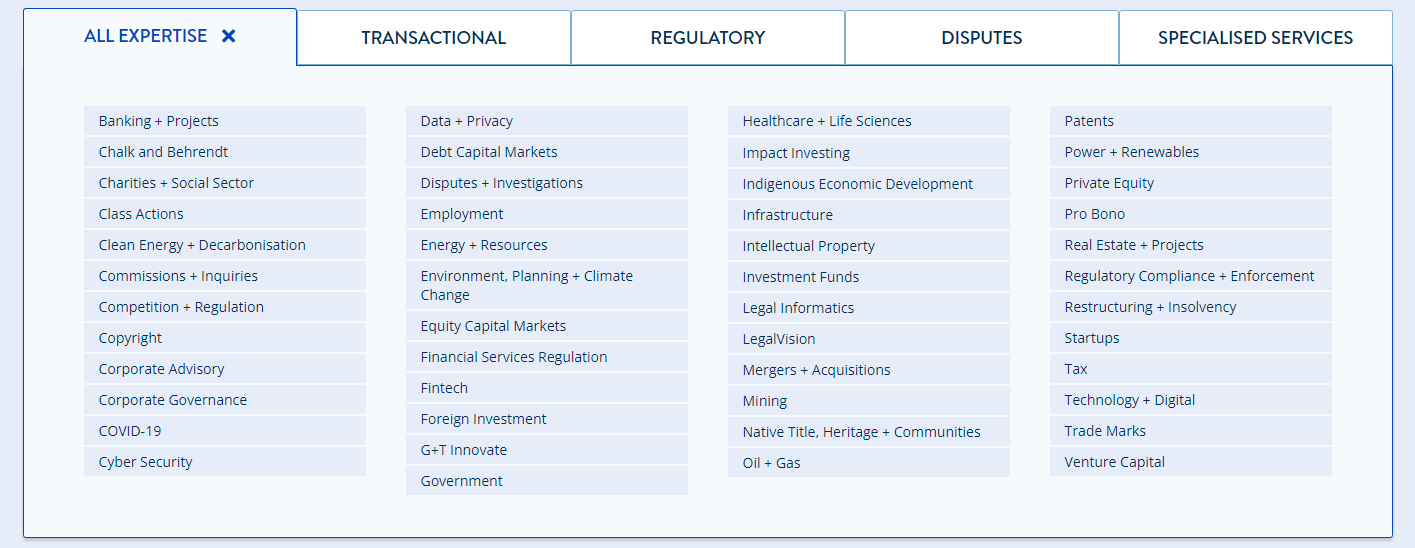
Then, link those service pages to a page illustrating how you can assist them with a particular issue.
For instance, if you help workplace victims, your web page should target content relevant to victims of workplace bullying, workplace harassment, and so on. Add similar keywords for a good grip on users. Ensure that all services of any value are featured.
A highly effective SEO campaign is backed by top-quality backlinks—links from other sites pointing to your site.
Here's an example: An article on flight refunds linking to Slaton and Gordon lawyer firm.

These inbound links should be relevant and must come from a varied range of domains, which is essential if you want your backlinks to sound natural in the eyes of Google.
Link building is one of the best off-page SEO practices.
A healthy link profile—links coming from high-quality sites—signals Google that your site is trustworthy and deserves better rankings.
Again, creating high-quality content is key. Only linkable content pushes people to refer to it willfully. Online sources mention your blog only when you have something worth sharing and linking.
Another sure-fire way to earn backlinks is via guest blogging. You post content on other niche-relevant sites. You can find law-relevant sites and outreach them with your guest post pitch. A good topic suggestion melts the owner or managers of such sites.
One more tactic is to offer the latest legal news to sites publishing law content.
And here, we complete the basics of SEO. Now let's move to the other parts of online marketing.

Contrary to the concept of driving clients in, social media marketing is about going to where your clients are. And when you think of where your audience lives in this digital age, social media channels like Facebook and Instagram come first to your mind.
If you argue, "social media is not a law firm thing."
I would say not your law firm, but your audience does live on social media. Take a look around your physical world; you will find many people scrolling through at least one social network.
Facebook alone has 3.51+ billion monthly active Family product users.
Besides, here's the data on the most popular social media networks worldwide in July 2021, ranked by the total number of active users(in millions).

Will you take it seriously now?
With some considerate investment and tactics, you can drive significant growth to your law firm through social media marketing.
However, there are plenty of social networks to choose from.
You need to determine which social media platforms best fit your law firm and practice area.
Here's some quick advice:
Finally, take extreme care of ethics and advertising rules in your law firm industry. For example, don't label yourself as an expert or specialist unless you have a formal certificate. Be watchful for building inappropriate lawyer-client relationships.
Your law firm website is not the only place where people come to find you. From listing sites like Google My Business to the king of reviews Yelp to your local listing, there are a great deal of free online profiles lingeries within your reach. Start claiming them now and market your business for free.
Here's a list of nine free places to list your law firm.
If you argue, "social media is not a law firm thing."
Avvo is a mixture of Lawyer' Yelp and a Quora of Law.

When it comes to reviews, Yelp is the first to pop up in mind. Visit Yelp for Business owners, create your profile, add business logos, upload your lawyers' photos, request your happy clients to leave positive reviews, and positively respond to negative reviews.

Google My Business is becoming a synonym of the business listing. Time to play along. Create an account and get your law firm listed on Google Maps.

Like Google, Bing also offers space for local listings in its top search results.

If your clients are iPhone and iPad users, your firm should appear in Apple Maps. You won't gain search results advantages, but it will help to win iPhone and iPad clientele.

If your clients are iPhone and iPad users, your firm should appear in Apple Maps. You won't gain search results advantages, but it will help to win iPhone and iPad clientele.

Oh yes, they are still here. Although it's not the first place your clients will look for when seeking legal advice, it still works for audiences living in rural areas. Even today, some areas are devoid of internet services. For them, yellow pages are the first preference to look for legal services.

This portal has plenty of lawyer profiles! Add yours too.

Go through the list, set up your profile, and take advantage of all the available options.
The Google 3 Pack is the first your local client notices when they search for nearby local services.
Here's an example of Google 3 Pack:
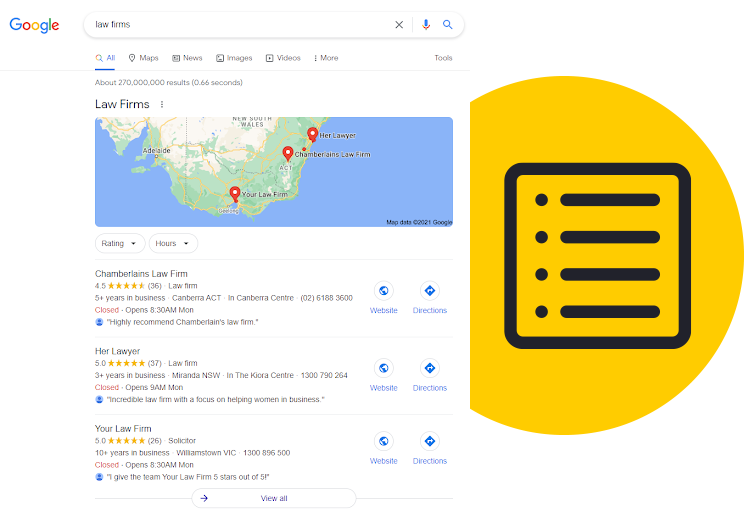
And whoever ranks on that list will be the prior choice of prospects.
Hence, do everything possible to rank on this list.
The good news is it's much easier than you think.
Here's how you get started:
Once you complete the process and get verified by Google, this is how your Business Profile will look like on Google with maps:
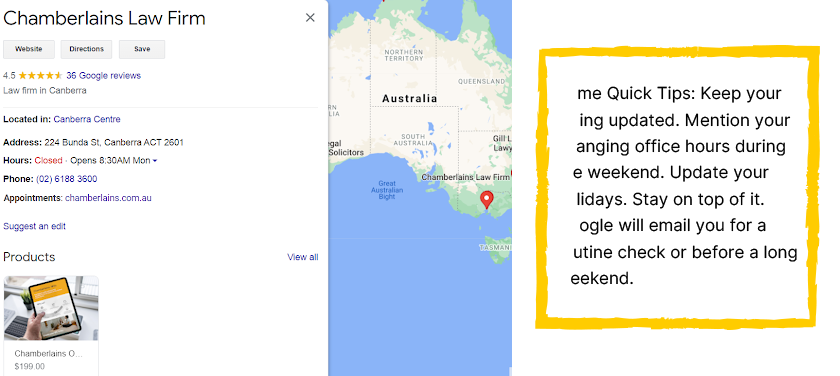
Once you have a couple of online profiles under your law firm name, be ready to receive and manage client reviews. As per the 2019 Legal Trends Report, today's legal customers thoroughly research, read reviews, and evaluate ratings before selecting their lawyer.
Let's say if I encounter a couple of law firms and want to choose one, I would go for a firm with maximum ratings and reviews like the one I highlighted in the below image:

Make it a part of your strategy to request clients for online reviews at the end of every case, especially if it's a satisfied client. However, keep a keen eye on advertising rules to ensure your request looks natural.
Of course, positive reviews are a goldmine.
What about negative reviews?
While a few negative reviews won't hurt, a recurring stream may stop prospects from contacting you. It may also prevent Google from showing you in the 3-pack.
96% of persons looking for legal advice use a search engine to find it.
Building links for a law firm's website SEO is still vital to rank highly in search engines.
Well, if you encounter a negative review, don't ignore it. Respond positively. If possible, take care of the issue on the spot or promise to do so next time.

Attention is an asset.
Why?
Distraction is all around.
Every business is trying to get your attention. This is the reason why Facebook shows you stuff that's designed to keep you hooked and distracted from other important tasks.
But, it pays the bills for businesses marketing such stuff.
How does it relate to your marketing?
Well, video is the best way to catch the eyeballs of your targeted audience. The below data shows the growing popularity of videos as an addiction.
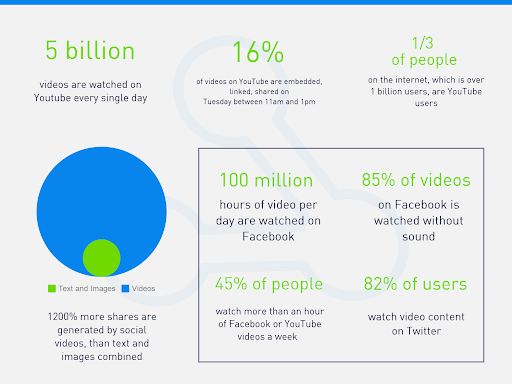
The fact is website visitors like video. It's a quick way to consume content as compared to reading. Visuals are also pretty good at maintaining engagement. And the longer your website keeps users engaged, the better you gain SEO advantages.
It's never been easier to produce videos with a smartphone in your pocket.
To start leveraging this evergreen visual channel. Share your knowledge, build expertise, stand apart, and gather new clients.
Another plus point is media outlets are always on the hunt for the latest news and expert opinions. When they notice your high-quality profound videos, they are more likely to reach out to you. Law advice-seekers will subscribe to your YouTube channel.
Simply, the benefits are endless.
Here are some quick tips for your video creation journey:
With time and consistency, you can create an impressive collection of educational videos.
Just think about it. How will your firm look with insightful videos?
You are not showing your proficiency but also building rapport by answering frequently asked questions.
Take a look at Allens law firm shining with their separate YouTube channel. Here they share thoughts relevant to their services and motivate young lawyers to fulfil their dreams:
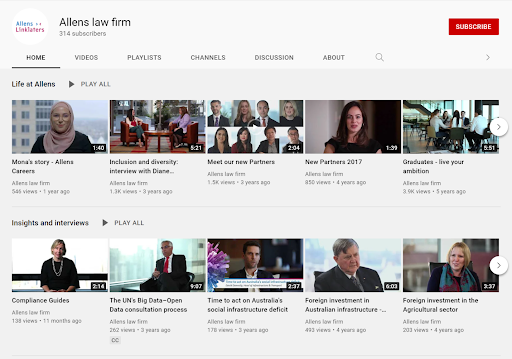
Create a realistic video production plan and stick to it. Before you realize it, you'll have an attractive list of educational videos.
Remember the days when lawyers participated in educational seminars.
Now the ways have changed.
Enter webinars—an online event hosted by organizations. Call it an online form of seminars.
Deliver all the seminar benefits to your audience without making them leave their home. The future of education is already here.
Reach maximum people from the comfort of your home. Save time and money. Instantly go live and start communicating your experience. Enable participants to ask questions and answer them on the spot. Better to record for people who missed live recording.
Sounds exciting?
Let's add another amusing news.
In the world of automation, you can run webinars while you sleep.
You just need to select the best webinar marketing platforms to get your law firm webinar strategy up and running. These platforms will let you host, record, manage, and market webinars efficiently.
Here is the list of the top eight best webinar platforms:








Once again – stick to consistency. In the case of webinars, quarterly works fine.
If videos and webinars are not your cup of tea, you can also go for podcasting.
Podcasts are the choice of many since they allow people to listen on the go—driving, sleeping, travelling, waiting in the queue, you name it.
Availing your podcast on platforms makes your brand go online as you start gaining visibility.
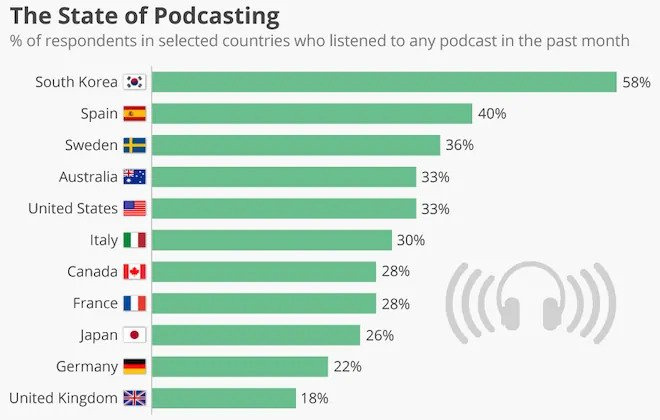
There are plenty of tricks and hacks you can use to boost your branding via podcasts. Some of the popular strategies are:
To get started with podcasting, you just need to record your voice, share insights, and upload your recordings to popular platforms like Apple Podcasts, iTunes, Spotify, Google Play, and many other platforms. You can also upload your podcasts on your website.
Boom!
You are well on your way to becoming an expert.
Chamberlains Law Firm has a landing page dedicated to their podcasts:

Again you can embrace podcast hosting platforms to get the load off your shoulder.
Some of the best podcast hosting companies are:






Online marketing is your growth channel in today's world, but law firms still depend on word of mouth and referrals. Email marketing sits at the crossroads of these two spots.
You can't control search engines and social media.
You can't do anything when Facebook and Google change their rules, making you lose 10K Facebook followers.
But you do run a show on your email list.
That's why many businesses are embracing email marketing.
It helps businesses stay connected with a massive network of people at marginal effort while simultaneously sustaining word-of-mouth marketing.
Here's what you'll need to get started with email marketing
What's your goal for email marketing? Do you want to keep in touch with past clients? Do you want to generate referrals from other professionals? Do you want to create newsletters for brand awareness? Or anything else.
Segment your email list in one group of current clients, one of the potential clients, one of the attorney relationships, and so on.
What type of email campaigns do you want to run for a particular group?
Your goal with any email marketing campaign is always to create something that users want to read.
With email marketing, you are committing to the long game. The client may not buy your legal management product or legal service right away but will see you as an authority. And when they decide to go ahead with their buying decision, you will be on top of their mind.
Google ads are the fastest way to get your website on top of Google search results. It's the service provided by Google.
It works like this: you choose the keywords and bid on them. Google will show your ads whenever users search with similar keywords. You'll only pay when people click on your ad (a.k.a. Pay per click)
Thus, it's an effective PPC campaign for quick results.
Your Google ad will appear in the first two three search results like this:
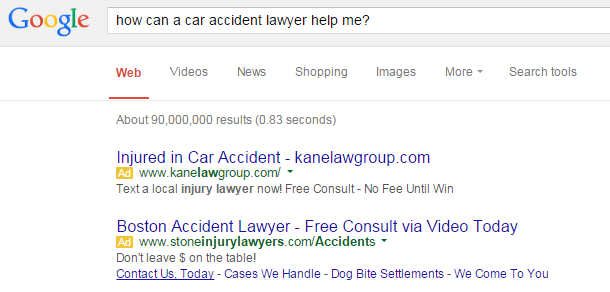
Ads may also appear in the last few results of the search engines.
Although the conversion rate of PPC ads is lower than organic search results, it will help you get a handful of clients initially. However, you need some experience to achieve success with PPC campaigns.
Here are a few tips to achieve your PPC success:
It generally depends on your practice space. Lawyers relying solely on PPC to acquire clients start with at least $1000 a month. You can adjust the investment amount depending on your revenue and other marketing strategies.
It generally depends on your practice space. Lawyers relying solely on PPC to acquire clients start with at least $1000 a month. You can adjust the investment amount depending on your revenue and other marketing strategies.
Monitor data, test a couple of ad copies, test landing pages, and the time people stay, review, and refine your ads. Take some time aside to measure your progress.
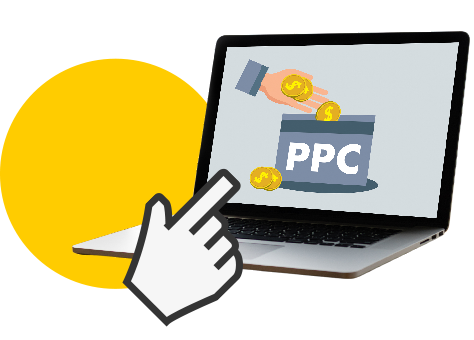
It happens a lot. People come to your visit, explore it for a while, and leave. It means they are interested but need a little nudge. Retargeting helps you target these prospects through advertisements.
Remember those ads appearing from the sites or products you recently visited. Switch off your adblocker; you'll understand what I mean.
Ads are everywhere.
Your law firm can use them to retargeted recent interested visitors. Choose platforms like Google, Facebook, and LinkedIn for your retargeting campaigns.

No matter how you market your law firm, it's essential to measure the return on investment of your time and efforts.
Without measurement, you won't know which campaigns are bringing clients and which are crashing. You must not overlook this step. It helps you stop flopping marketing tactics and multiply on well-performing methods.
But how will you measure your performance?
Look at the numbers.
The number of visitors, clients, organic traffic, and other results before and after marketing.
A low-tech method would be to ask clients where they heard about you. But it will take time. For now, you need some solid facts to keep your marketing efforts going.
One way to gather the facts is to use the free version of Google Analytics. It's a tool providing insights into website traffic.
Or you can try a paid tool like Ahrefs. This will help you see things like websites users visited before they landed on your site (a.k.a. "referring domain"), how long visitors stayed on your site, and of course, the total number of visitors to your site.
Take a look at an overview of a site's analysis when I inserted the URL in Ahrefs:
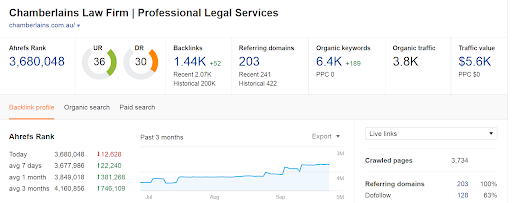

When it comes to marketing a legal firm, the best strategy is just to start. Make a tiny investment, try something new, track your progress, and use what you've learnt for your next project. Instead of overextending yourself, concentrate on a few essential areas, develop a reasonable marketing budget (and stick to it), and leverage technology to aid your efforts. This way, you can make the decisions better for your company by aligning your goals and strategy; taking a pragmatic approach.
Whatever marketing strategies you choose, keep your clients (and potential clients) in mind at all times. Law firms that can provide an exceptional client experience will push themselves to run their practices more effectively to give good service, raising their bottom line and increasing their referral opportunities.

We would love to assist you. Get in touch now.
